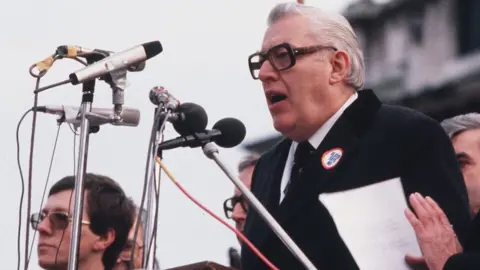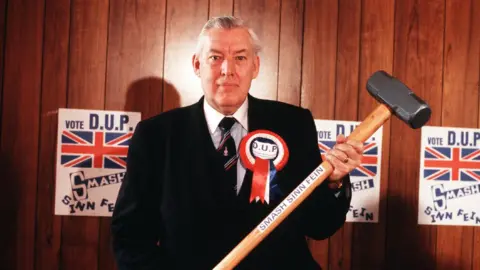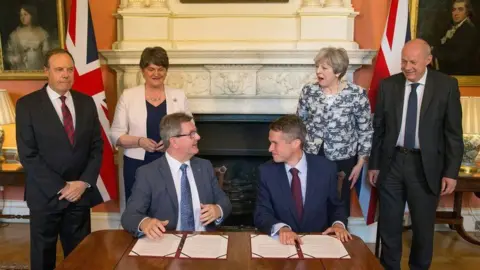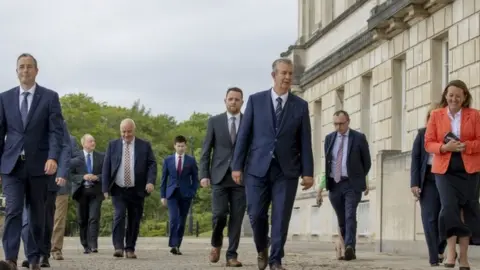DUP leadership: The party that went from firebrands to government
 Pacemaker
PacemakerAcross 50 years, the Democratic Unionist Party (DUP) has moved from dissent on the margins of politics to the heart of Northern Ireland's government.
Co-founded in September 1971 by the Reverend Ian Paisley, the party stood in opposition to republican violence and any involvement of the Irish government in Northern Ireland's affairs.
Down the years, the DUP helped topple other unionist leaders, accusing them of selling out by establishing power-sharing assemblies with nationalists and republicans or seeking further co-operation with the Republic of Ireland.
However, this changed in 2007 when Mr Paisley agreed to enter government with Sinn Féin and struck up an unlikely friendship with a once sworn enemy, Martin McGuinness.
Fierce opposition
When the DUP was formed, Northern Ireland was gripped by the Troubles, which had started two years earlier.
Mr Paisley, elected in 1970 as an MP, and Desmond Boal, pitched the DUP's politics as an alternative to the leadership of the Ulster Unionist Party (UUP).
They also drew heavily on support from Mr Paisley's Free Presbyterian Church, with fundamental Protestant beliefs at the core of the party's policies.
 Pacemaker
PacemakerWhen UUP leader Brian Faulkner led unionists into the Sunningdale Agreement talks in 1973, which envisioned a devolved government made up of unionists and nationalists, he was branded a 'sell-out' by the DUP.
Sunningdale did produce a short-lived power-sharing assembly, but this was brought down by the Ulster Workers' Council strike in 1974, in which Mr Paisley was a key player.
In 1985, then Prime Minister Margaret Thatcher made another attempt to settle tensions by signing the Anglo-Irish Agreement, which gave the Irish government an advisory role in Northern Ireland's affairs.
 Pacemaker
PacemakerThe DUP, UUP and other unionists joined in mass "Ulster Says No" rallies with about 400,000 signatures gathered in a petition.
On 23 November 1985, hundreds of thousands of people amassed at Belfast City Hall as Mr Paisley exclaimed: "Never, never, never, never".
'Smash Sinn Féin'
During the 1980s and 90s, as the Troubles continued to rage, the republican party Sinn Féin, considered the political arm of the IRA, grew its support at the ballot box.
To counter this, the DUP boycotted meetings and ran candidates under the slogan "Smash Sinn Féin".
 Pacemaker
PacemakerIn 1998, the DUP opposed the Good Friday Agreement, criticising prisoner releases and objecting to republicans forming part of the NI Executive while the IRA remained active.
Running under a campaign of "It's time for a fair deal", the DUP made moves on the UUP electorally, becoming the assembly's largest party in 2003 and later NI's largest party at Westminster.
'The Chuckle Brothers'
After the assembly had collapsed a number of times, multi-party talks were held in St Andrews in Scotland in October 2006.
A breakthrough was reached, with the DUP and Sinn Féin, the largest parties, agreeing to enter a new executive with Ian Paisley as first minister and Martin McGuinness, a former senior IRA member, as deputy first minister.
An unlikely bond was struck between the men and they would commonly be referred to as "the Chuckle Brothers".
 charles mcquillan
charles mcquillanIn 2008, Peter Robinson succeeded Mr Paisley as DUP leader and first minister.
While his relationship with Mr McGuinness was not as close as his predecessor's, Mr Robinson worked with Sinn Féin to oversee the devolution of policing and justice powers to Northern Ireland and in 2011 led the DUP to its highest seat total in the assembly up to that point.
When he stood down in January 2016, Arlene Foster became first minister.
While she too worked with Mr McGuinness, the assembly collapsed just a year later when Sinn Féin pulled out of the executive over the so-called "Cash for Ash" scandal.
This referred to the Renewable Heat Incentive scheme (RHI) which a subsequent inquiry found involved "unacceptable" behaviour from some officials, ministers and special advisors.
 PA Media
PA MediaWhile Stormont was suspended, the DUP entered a confidence-and-supply agreement with the Conservatives, which had lost its majority in the snap General Election of 2017.
The DUP, which had backed Brexit, held the balance of power and exercised control over Theresa May's government.
Many of the party's social policies opposing abortion and same-sex marriage rights, for instance, were brought to prominence in Great Britain.
The agreement ended when, in December 2019, Boris Johnson led the Tories to an overall majority.
The assembly returned in January 2020 and the DUP once again shared power with Sinn Féin, this time with Mrs Foster as first minister and Michelle O'Neill as deputy first minister.
The new government was soon dealing with the Covid-19 pandemic and although there was much unity in the early months, strains soon began to show.
In May 2021, these strains, along with criticism of Mrs Foster's handling of the post-Brexit trade arrangements for Northern Ireland - known as the protocol - proved too much for her colleagues, who ousted her in a coup.
 Press Association
Press AssociationIn the subsequent leadership contest, a first for the DUP, Edwin Poots narrowly defeated the Lagan Valley MP Sir Jeffrey Donaldson.
However, after 21 days in the role, Mr Poots announced that he would step down following internal divisions.
A majority of DUP MPs and MLAs revolted following Mr Poots' decision to nominate a first minister after Sinn Féin said it would not nominate a deputy first minister unless there were commitments on legislation for Irish language provisions.
The UK government said it would legislate if Stormont failed to do so.
On 17 May, following a meeting with party officers, Mr Poots said he would resign, with Sir Jeffrey the favourite to succeed him.
The episode leaves the party seeking a third leader in two months, with much healing required to unite its warring factions.
